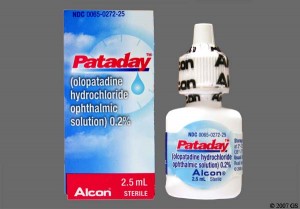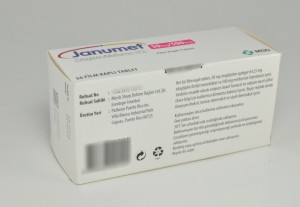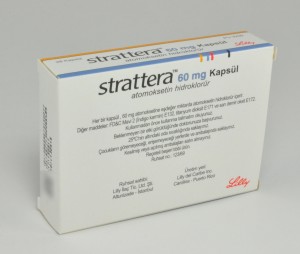by PharmacyChecker.com | Aug 30, 2013 | Drug Importation, Drug Prices, Online Pharmacies

Pataday in its American packaging
A weekly series identifying prescription drugs manufactured in America and their prices.
Pataday (olopatadine hydrochloride ophthalmic solution) is a solution used for the treatment of itchy or watering eyes caused by allergies. Pataday is manufactured in the U.S., but that doesn’t mean that’s where it’s cheapest for Americans. In fact, you can save 79% by ordering it from a verified foreign online pharmacy: one 2.5 ml vial of Pataday costs $161 at a Walgreens in New York City, but only $34 from a PharmacyChecker.com-approved pharmacy.
Tagged with: American Made Prescriptions Are Cheaper Abroad, Eye Drops, Pataday
by PharmacyChecker.com | Aug 29, 2013 | Advocacy, Pharmaceutical Industry
Our friends at RxRights have chastised CVS’s new ExtraCare Pharmacy & Health Rewards program because its participants must sign a HIIPA waiver. HIIPA, the Health Insurance Portability and Accountability Act, is the federal law that protects customers’ health information. RxRights is concerned that CVS will share its prescription sales data with pharmaceutical companies, assisting them in use direct to consumer marketing that can lead to higher medicine costs.
Check out the full blog post on RxRights.org.
by Gabriel Levitt, Vice President, PharmacyChecker.com and Sam Werbalowsky, Pharmacychecker.com | Aug 22, 2013 | Advocacy, Drug Prices, Healthcare Reform
Americans with high out-of-pocket healthcare costs will be disappointed with a new Affordable Care Act (Obamacare) delay announced by the Obama administration. The delay allows insurers and employers using more than one benefits administrator to wait one extra year – until 2015 – before being required to limit out-of-pocket costs to a maximum of $6,350 for an individual or $12,700 for a family, as mandated by the law. Instead, they will be permitted to maintain separate out-of-pocket limits for various benefits. For example, a patient may have a $6,350 cap for doctor visits and another $6,350 cap for prescription drugs.
Except that there may actually be no cap at all for prescription drug plans. Plans currently without out-of-pocket caps will not be subject to mandatory ones in 2014.
The only reason for the delay mentioned in a recent New York Times article is a technological problem. Many companies use different administrators for different benefits, and their computer systems are currently unable to combine all costs from different programs for a given patient. As the New York Times says, “In many cases, the companies have separate computer systems that cannot communicate with one another.” Companies need more time to upgrade their software to accommodate this.
Obamacare was passed in 2010, and the mandatory out-of-pocket limits were slated to go into effect in 2014, giving companies four years to figure out how to get their computers to talk to each other.
This does not seem like a legitimate reason to delay prescription drug spending caps. Fifty million adults did not fill a prescription last year due to cost; access to affordable medicine is a big problem in the United States, and failure to implement out-of-pocket spending limits will likely keep prescriptions unfilled.
Fortunately, safe international pharmacies offer low prices to Americans. As of last November, prices for brand name medication were 85% less expensive from them when compared to U.S. pharmacies. If you choose to order medication from abroad, make sure the pharmacy is a PharmacyChecker.com verified online pharmacy.
by PharmacyChecker.com | Aug 21, 2013 | Drug Importation, Drug Prices, Online Pharmacies
 A weekly series identifying prescription drugs manufactured in America and their prices.
A weekly series identifying prescription drugs manufactured in America and their prices.
Janumet (Sitagliptin Metformin HCL) is a popular prescription drug that combines two different diabetes medications, Januvia (sitagliptin) and metformin. Janumet is only for individuals with type II diabetes. It is manufactured by Patheon in the U.S., and is marketed by Merck. Despite being made in the U.S., the price for Janumet is much lower for Americans who choose to order it from a verified international online pharmacy rather than a U.S. pharmacy. From the former, 180 pills of Janumet 50/500 mg costs $172. From the latter, the same quantity costs a staggering $1,050. That’s a 83% savings, or $3,512 over the course of one year.
Find a verified international online pharmacy today.
Tagged with: American Made Prescriptions Are Cheaper Abroad, diabetes, Janumet, Merck, Patheon
by PharmacyChecker.com | Aug 14, 2013 | Drug Importation, Drug Prices, Online Pharmacies
 A weekly series identifying prescription drugs manufactured in America and their prices.
A weekly series identifying prescription drugs manufactured in America and their prices.
Strattera (Atomoxetine HCl) is a popular attention deficit hyperactivity disorder medication for use by children and adults. Strattera, an Eli Lilly product, is manufactured right here in the U.S.A., but is far more expensive in American pharmacies than elsewhere. In fact, the price difference is shocking – 90 capsules (25 mg) will run you $828 at a Rite-Aid in New York City; from a verified international pharmacy it only costs $310.50. That’s a 63% savings, or just under $2,100 over the course of a year.
Check back next week for the savings on another American drug available abroad.
Tagged with: ADHD, American Made Prescriptions Are Cheaper Abroad, Eli Lilly, Strattera
by Gabriel Levitt, Vice President, PharmacyChecker.com and Sam Werbalowsky, Pharmacychecker.com | Aug 13, 2013 | Drug Prices, Medication non-adherence, Skipping medications
Seniors are continuing to skip meals or leave prescriptions unfilled due to budgetary constraints, according to a survey conducted by Public Health Management Corporation’s Center for Data Innovation (PHMC). PMHC surveyed 10,000 households in Southeastern Pennsylvania, and found that 112,500 older adults (60 +) in the region skipped a meal or didn’t fill a prescription because of tight budgets. The study points out that skipping either medication or a meal often leads to negative health outcomes. Many of the older adults skipping either had a chronic condition; 81% had arthritis, 67% had high blood pressure, and 50% had diabetes.
Read the results of the survey here.





